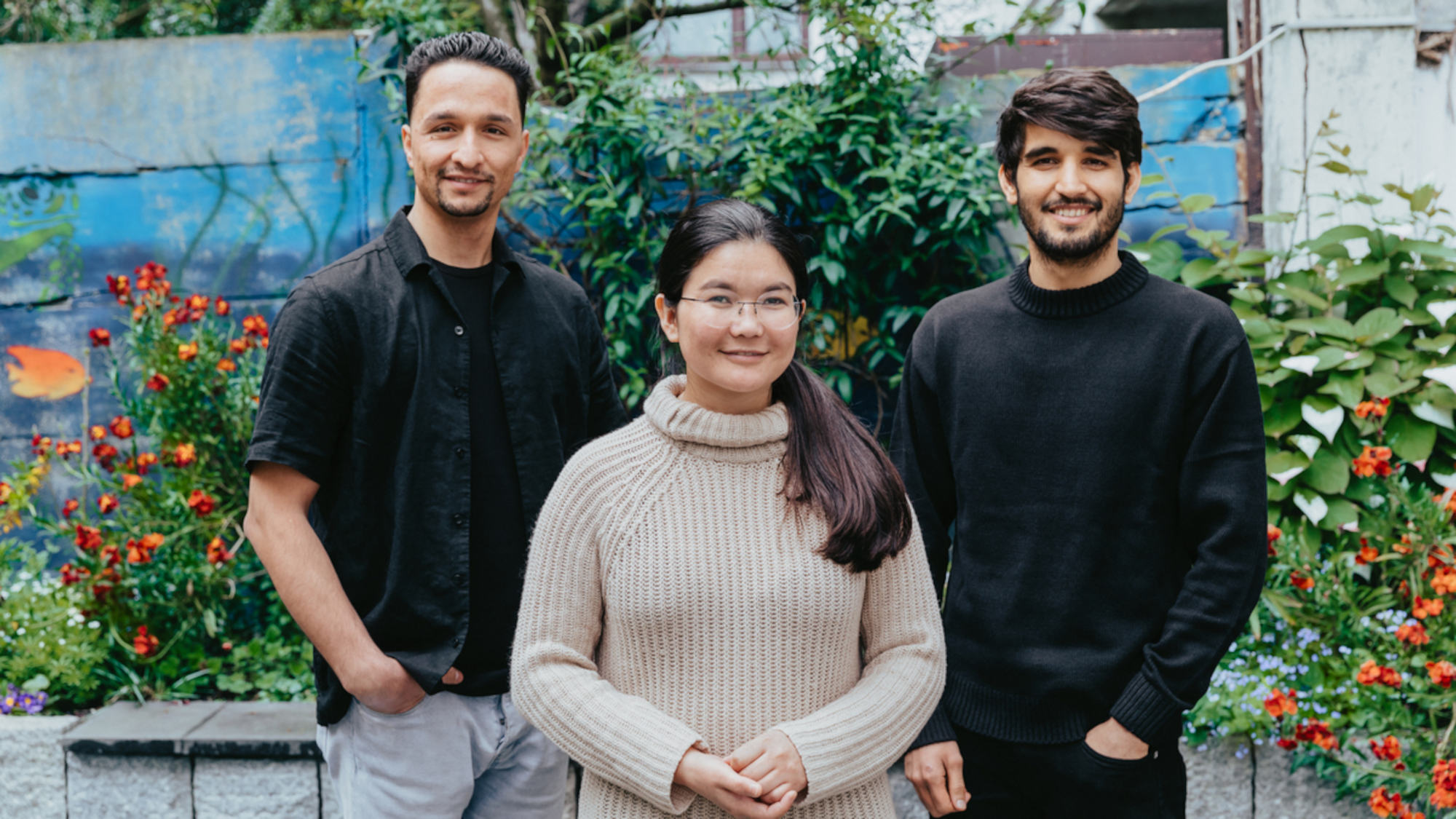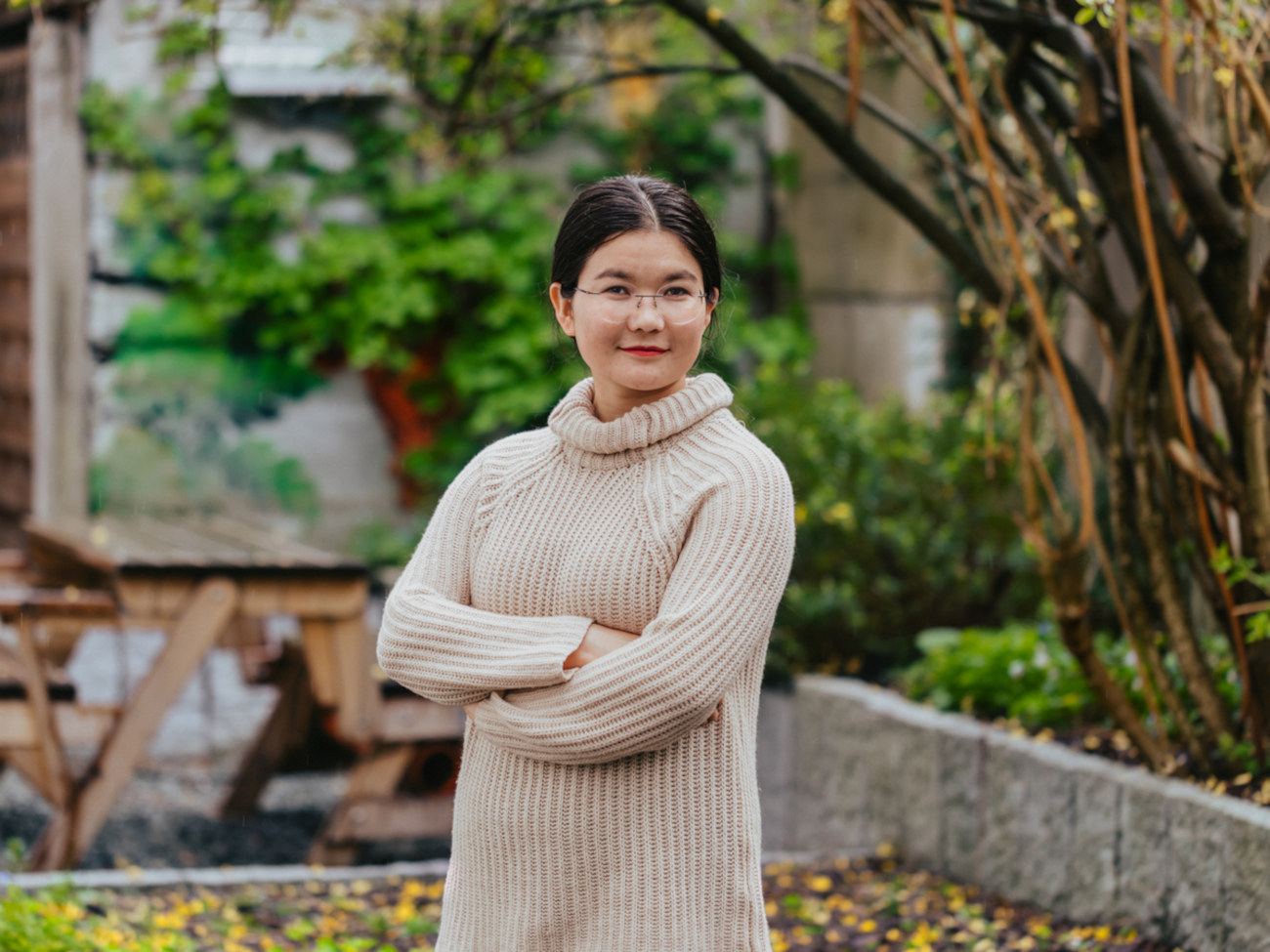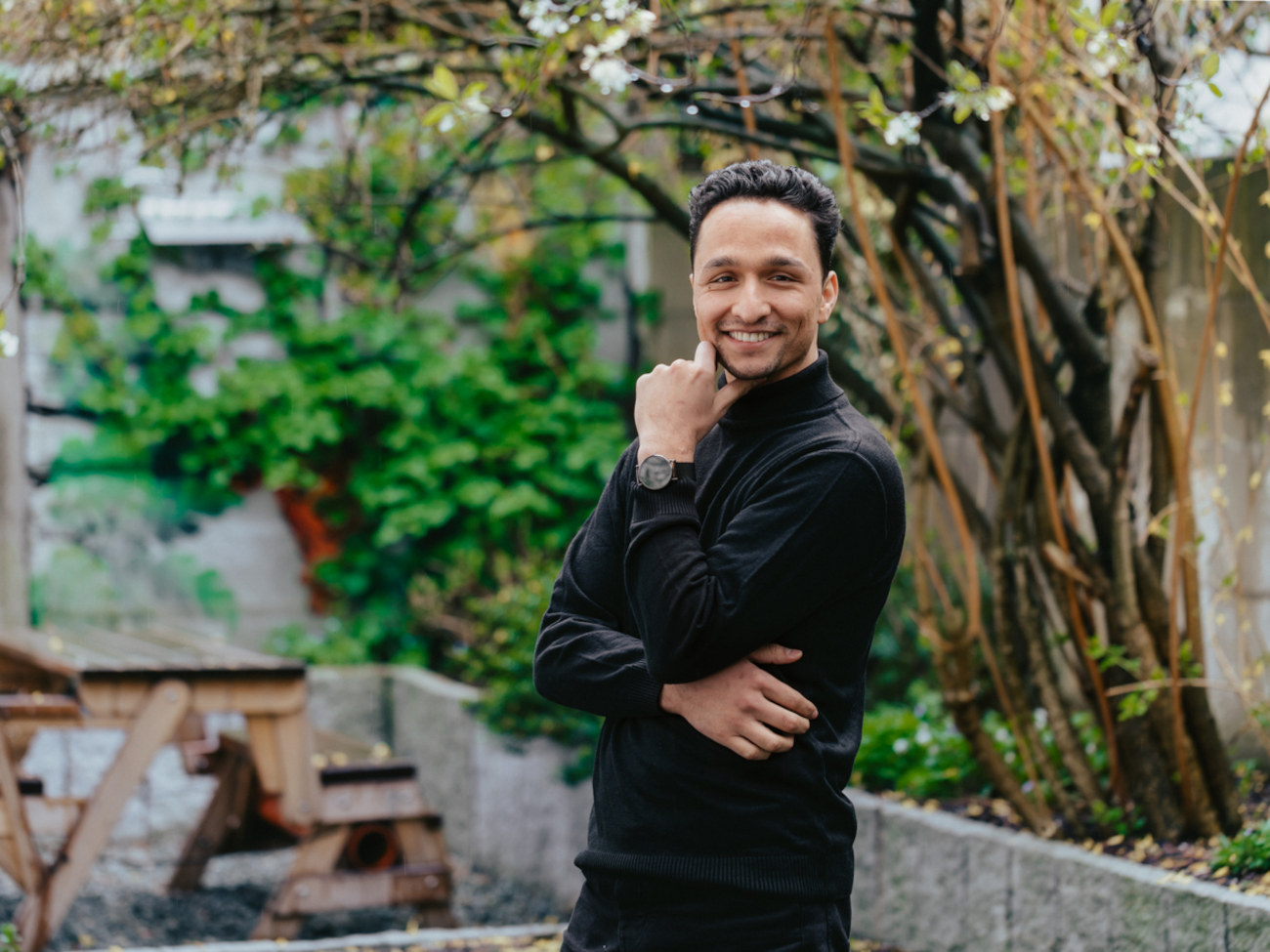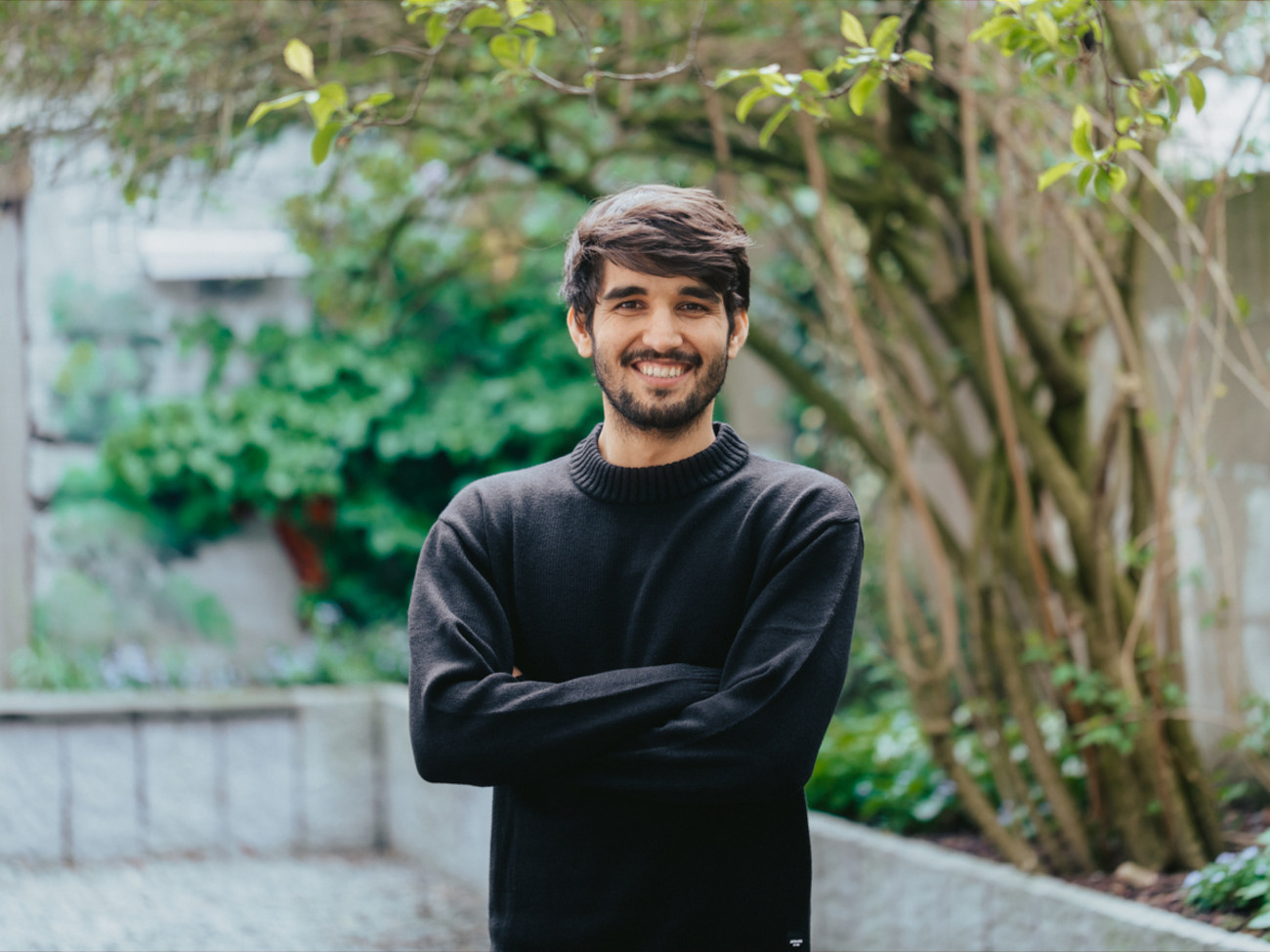
© Matej Meza / Universität Bremen
“The Only Chance to Do Something Meaningful”
Omid Farda scholarship: How three young people from Afghanistan navigate their way to studying at the University of Bremen
Technically, they should still be in class for another half hour. But Nazdana Sultanfar, Sohrab Zarbafiyan, and Mohammad Fahim Amini have left their German class a little earlier today. The Afghan students have an interview appointment with up2date magazine. They will have to catch up on the work later. And yet, they enter the room at the CASA language school where our interview is taking place with a smile on their faces. Why are they taking time out of their day for this? The three of them have a mission. They consider themselves to be a voice – the voice of the people in their home country who have been silenced.
Almost a year ago, Nazdana Sultanfar, Sohrab Zarbafiyan, and Mohammad Fahim Amini arrived in Bremen from their home country on an Omid Farda Scholarship from the University of Bremen and the HERE AHEAD Academy. They are among eleven young people under the age of 30 who were able to convince the jury in a tough selection process. Well over 5,000 people applied for the limited number of scholarships. The scholarship aims to enable dedicated and at-risk Afghans to continue their academic careers, which they had to abandon or were not even able to begin after the Taliban came to power in summer 2021, at the University of Bremen.
A Dream: To Become the First Minister for Women’s Affairs in a Free Afghanistan
“I’m very happy to be here, but it’s also hard,” says Nazdana Sultanfar. On the one hand, the 22-year-old from Kabul is happy to have made it. She is in Germany, can live in peace, and soon will be able to continue her degree in political science. Or maybe law, after all? She has choices and can decide for herself what she wants to do with her life. A good feeling. On the other hand, in her home country, millions of women are denied access to education. Nazdana Sultanfar wants to talk about them so that the world keeps on paying attention: “There is no more freedom in my country. Women are not allowed to do anything, just to be at home and look after their husbands and children. Thinking about this is very painful for me.” But giving up is not an option for her. The student has a plan. One day, she wants to become the first Minister for Women’s Affairs in a free Afghanistan.

© Matej Meza / Universität Bremen
But Nazdana Sultanfar still has a lot to do before things might eventually reach that point. Her next step is to take the German test for the C1 level of the Common European Framework of Reference for Languages. This certificate is a prerequisite for the scholarship holders wanting to study at the University of Bremen in the 2024/25 winter semester. They are therefore currently cramming German vocabulary and grammar at a fast pace.
“One Life Is Too Short to Learn German”
The daily routine of Sohrab Zarbafiyan, another scholarship holder, shows just how tightly packed the program is. He has no free time. When he is not cooking, eating, showering, or sleeping, he is and has been studying. Every day. For eleven months. “We have a saying: One life is too short to learn German,” the 28-year-old smiles. But his next words reveal that there is a bitter reality behind this casual saying: “We have to pass the C1 exam so that we can study here. This is my only chance to do something meaningful with my life.” Sohrab Zarbafiyan comes from Herat, the third largest city in Afghanistan. Until the Taliban seized power, he studied computer science and communications technology at the American University of Afghanistan. He already holds a bachelor’s degree, but that is not enough for the ambitious young man. He is aiming for a master’s degree in computer science, with a focus on artificial intelligence. After that, he would like to pursue a doctorate.

© Matej Meza / Universität Bremen
The Taliban have imposed tough restrictions on well-educated Afghans like him. In addition, his family worked for various civil society organizations before the takeover, which is why he no longer feels safe in his home country: “Anyone who tries to get an education is persecuted and subjected to repression.” He has heard that it is now mainly mullahs, i.e. clerics loyal to the regime, who are teaching at universities. “What kind of education is that supposed to be? The mullahs know nothing but being terrorists and killing innocent people. I cannot study or pursue a doctorate under such an authority. It does not make any sense at all.” His disappointment at the deterioration of his home country goes so far that Sohrab Zarbafiyan currently rules out ever returning there again. “I am going to stay here in Germany. I want to put my skills and knowledge to use here. Afghanistan simply doesn’t have the capacity to utilize my expertise,” he states.
Mohammad Fahim Amini has a similar view. The 26-year-old from Mazar-i-Sharif has also studied computer science. He has a clear vision of his future: “I want to stay here. Thanks to my academic education and with the help of the Germans, I will realize my dreams. I want to repay the kindness that the German people, the German government, and especially the staff at the University of Bremen have shown me in every situation,” he states. He rules out returning to Afghanistan. “I have lost many friends who were killed by the Taliban. I have no hope of a prosperous and peaceful Afghanistan,” he states calmly. But if you look closely, you can see that these words are difficult for him. Perhaps one day, he will be able to help his people from Germany. One aspect is important to him: “I can say without a doubt that the Omid Farda Scholarship came to our aid like an angel in the heart of darkness and took our hand to lead us to a future without war and misery.”
Germans Are Not All Serious and Mean; They Just Look That Way
When Mohammad Fahim Amini thinks back to his time traveling to Germany in the spring of 2023, he remembers the fear that accompanied him as he boarded the plane: What would his new life be like? Would he manage to make friends in Germany? “I had heard that Germans are very serious and mean. That they don’t talk to strangers. Now I know: Germans are not all mean. They have open hearts and like to help. They just sometimes look grumpy because they’re stressed,” he says. The young man is looking forward to being on campus every day soon and getting to know other young people at university. At the moment, he mainly spends time with the other scholarship holders, as they all live together at a student residence in Horn-Lehe. However, their everyday life is often so busy with learning that there is hardly any time for fun things.

© Matej Meza / Universität Bremen
Sometimes they cook together, but it is not always easy to get the necessary ingredients. Sohrab Zarbafiyan misses some foods that are easy to get anywhere in Afghanistan, for example special types of rice or certain organic products. He has made another observation: “The Germans like things very sweet. We tried mulled wine. That was completely new to me.” Mohammad Fahim Amini adds with a laugh: “Well, I like mulled wine. It tastes similar to a particular drink of the Afghan people, it’s called Haft Meywah. I could get used to it.” By the way: The entire interview was conducted in German. When the interviewer accidentally asked a question in English, Nazdana Sultanfar looked confused and said: “Sorry, but I do not speak English anymore. I only have German in my head.”
About the Omid Farda Scholarship
Even the name carries hope: The “Omid Farda” scholarship, Persian for “hope for tomorrow,” offers Afghan students the prospect of studying in Bremen. The scholarship was announced in early summer 2022 by the HERE AHEAD Academy. It stipulated clear criteria: Applicants could not be older than 30 years of age, their last school or university qualification or degree could not be older than five years, a transcript of records relating to one of the subjects offered at the University of Bremen was required, as was a statement of the current threat situation. More than 5,000 applications were received. This was followed by a tough and exhausting selection process based on an objective points system. The journey of the selected scholarship holders to Bremen was difficult because of the complex political situation in Afghanistan and neighboring countries. It was not until the summer of 2023 that all of them were welcomed to the Bremen campus. The Omid Farda scholarship is the first scholarship for Afghan students in Germany. There are currently no further scholarships available.
Further Information:
Interview with political scientist Klaus Schlichte: The Land of One Hundred Thousand Trade-Offs